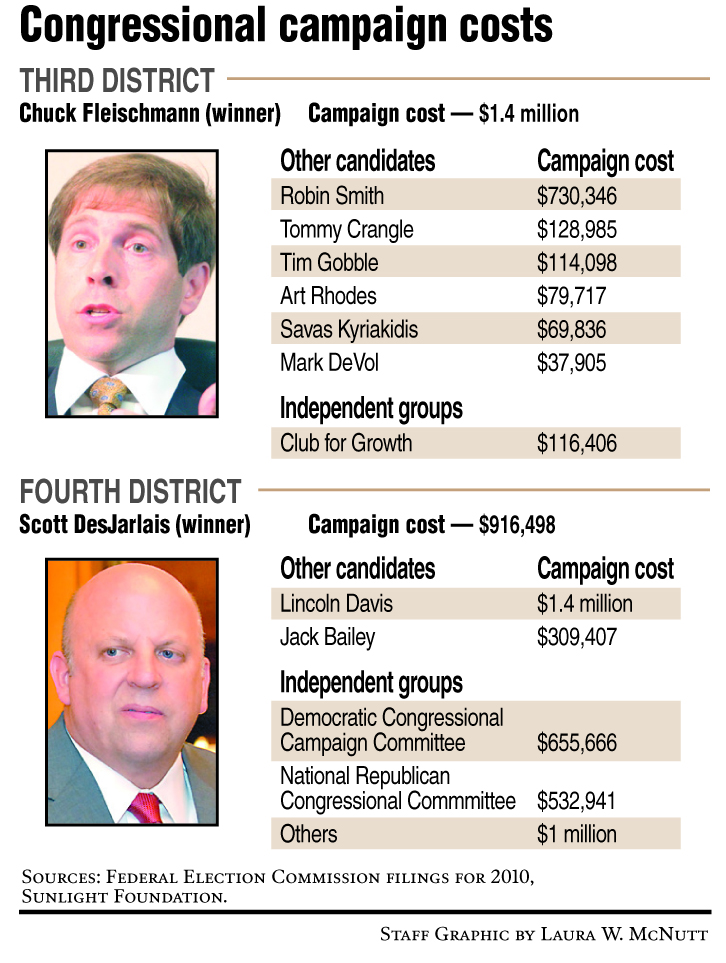Candidates and their supporters spent more than $7 million in Southeast Tennessee last year to vie for one of two $174,000-a-year jobs in the U.S. Congress, according to new financial disclosures.
Despite the recession - or perhaps because of it - a record amount of money filled the coffers of both candidate campaigns and independent groups trying to fill the seat being vacated by Rep. Zach Wamp, R-Tenn., in Tennessee's 3rd Congressional District and to oust U.S. Rep. Lincoln Davis, D-Tenn., in Tennessee's 4th Congressional District.
Chuck Fleischmann, the Chattanooga attorney elected to succeed Wamp, poured nearly $700,000 of his own money into his campaign, with most of the dollars spent in the GOP primary.
Fleischmann is yet to be repaid for any of those personal loans to his campaign, although he said he hopes to eventually recoup up to $250,000 of his campaign loans through fundraising this year.
Chip Saltsman, Fleischmann's campaign manager last year, said Fleischmann plans to begin fundraising for the next congressional campaign this month.
In his latest filing, Rep. Scott DesJarlais, R-Tenn., reported that he has already raised $44,763 since being elected to begin his campaign warchest for the 2012 campaign.
Fleischmann, a self-described fiscal conservative, insists his campaign was a good investment of his money.
"This was a lifelong dream of mine and I think the country really needs solid fiscal and social leadership right now," he said prior to addressing a weekend organizing convention of the Hamilton County Republican Party.
After winning the hotly contested, 11-candidate field of Republicans in the August GOP primary, Fleischmann spent only about half as much on the November general election and no more of his own money.
In fact, by October, Fleischmann was so confident in his own race, he donated $11,500 from his campaign coffers to other Republican state and congressional candidates, according to new campaign disclosures.
The newly elected GOP congressman said East Tennessee "is solidly red" and he is enjoying widespread support for his early efforts in Congress to repeal the federal health care reform plan adopted last year and to find ways to trim the budget and deficit.
"The people keep telling me to cut, cut, cut," Fleischmann said.
COSTLIER CAMPAIGNS
But candidates aren't cutting their campaign spending, Vanderbilt University political scientist Bruce Oppenheimer said.
"People are upset by the rising cost of medical care, but the cost of running campaigns has been going up even quicker," Oppenheimer said. "As long as there are people willing to invest their money in getting people elected, candidates and their political operatives are willing to spend more money."
In tougher economic times, Oppenheimer said money may be harder to come by, but more people are eager for political change.
In the sprawling 4th Congressional District, which includes more than two dozen counties in Middle and East Tennessee, Jasper physician DesJarlais and independent group supporters had to spend more money than in the past to get the name recognition to unseat Davis, a five-term incumbent, Oppenheimer said.
"The district includes four major media markets, so it can be expensive to gain the name recognition to beat an incumbent," he said. "But this was a tough year for Democrats everywhere, even one as conservative as Lincoln Davis."
Davis was endorsed by the U.S. Chamber of Commerce, the National Right to Life and the National Rifle Association and his campaign outspent DesJarlais by nearly a 3-2 margin.
Combined with independent groups that supported Davis, more than $2 million was spent on behalf of the Pall Mall Democrat, but Davis still lost the November election by a overwhelming 19 percent margin.
outside influence
Nearly as much money was spent by outside groups as was spent by the candidates' campaigns in the 4th Congressional District. Outside groups spent a record $2.1 million in the Davis-DesJarlais contest, according to the Sunlight Foundation, a nonprofit group that tracks campaign spending.
"Across the board, we're seeing more money being spent by independent groups, especially since the Citizens United decision (by the U.S. Supreme Court in early 2010) allowed these groups to raise far more money," said Paul Blumenthal, a senior writer for the Sunlight Foundation.
In January 2010, the U.S. Supreme Court voted 5-4 that the government may not ban political spending by corporations in candidate elections. That has allowed independent campaign groups to raise far more money and to spend their money more freely both for and against candidates in campaigns, Blumenthal said.
"Tennessee's 4th District provided a good opportunity for these groups to come in and get a win and a notch on their belt," he said.
For all the spending among Republicans in the 3rd Congressional District and both the leading candidates in the 4th District, Democrats in the heavily GOP 3rd District appear to have spent just a fraction of what their GOP counterparts spent.
Chattanooga attorney John Wolfe, the Democratic nominee, has yet to file a campaign disclosure for his 2010 campaign. Federal Elections Commission spokeswoman Julia Queen said candidates don't have to file a report unless they spend more than $5,000 in their campaign.
Although Wolfe said last year he planned to spend more than $15,000, the FEC doesn't investigate the lack of a campaign disclosure unless there is a complaint, Queen said.
In Georgia's 9th Congressional District, which stretches across North Georgia, Republican U.S. Rep. Tom Graves, reported spending $429,556 on the 2010 congressional campaign, even though he didn't have any opposition, according to FEC reports.
